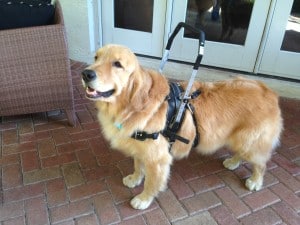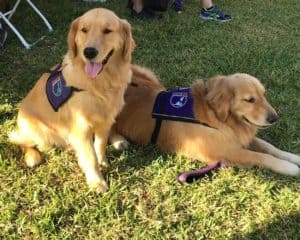Can an assistance dog help your loved one?
 Gone are the days where assistance (service) dogs in Florida were only used by the sight impaired or blind individuals. Today’s assistance dogs are as diverse in their training as the people they provide service to. At Genesis Assistance Dog’s, Inc. we specialize in the training of assistance dogs to serve individuals who are challenged by decreased mobility and balances issues. As you read on you will understand how finding the right type of assistance dog can help your loved one.
Gone are the days where assistance (service) dogs in Florida were only used by the sight impaired or blind individuals. Today’s assistance dogs are as diverse in their training as the people they provide service to. At Genesis Assistance Dog’s, Inc. we specialize in the training of assistance dogs to serve individuals who are challenged by decreased mobility and balances issues. As you read on you will understand how finding the right type of assistance dog can help your loved one.
To determine what kind of assistance dog can help your loved one you need to know about the differences between assistance (service) dogs in Florida, medical alert dogs, emotional support dogs and therapy dogs. Here’s a quick breakdown of the types of dogs that qualify as assistance dogs under the ADA:
1. Mobility Assistance Dogs – Larger breeds are usually the perfect match for this type of service dog as they are trained to walk alongside their human teammates. Some wear a customized harnesses to provide additional support. Some can assist with wheelchair movement. Pushing automatic door openers, turning on/off light switches, closing doors, opening doors, etc., basically anything that can assist the person who has difficulty with movements that most of us take for granted.
2. Medical Alert Dogs – This category encompasses dogs that can detect an oncoming seizure, a cardiac issue, epileptic episode or changes in blood sugar levels in their human companion. Dogs trained in this category will get help for their handler, can locate and retrieve cellphones, and alert others of the need for assistance. Medical alert dogs are never far away from their partners.
3. Autism Dogs – This is a new and unique type of service dog providing assistance to individuals who have been diagnosed with Autism. These dogs often have a calming effect on the autistic person. They can be trained to alert when they observe behaviors that need to be avoided such as impulsive running or self-harming, and sensing mood swings. Many autistic individuals are non-verbal yet they can work to give their dogs commands building verbal communication skills.
4. Psychiatric Assistance Dogs are those that are trained to provide support to individuals with mental disabilities. They can stop or prevent self-harm behavior, assist them during panic attacks (or help them be avoided), and detect other unacceptable behaviors. These dogs never leave their partners side unless he/she directs them to. They are not emotional support dogs.
5. Sight Dogs (Guide Dogs) provide assistance in getting their person around obstacles. They are trained to stop when changes in elevation (curbs, steps etc.) occur, when overhead obstacles appear and to stop when given a command they believe is unsafe. Once referred to as “seeing-eye dogs” they provide help to the visually impaired and legally blind individuals.
6. Hearing Dogs are assistance dogs trained to alert when sounds occur that their handler cannot hear. They alert to alarms, telephones, door bells, etc.
Emotional Support Dogs are not covered under the auspices of the ADA. These dogs are most often pets trained to help their owners cope with the stresses of everyday life.
Therapy Dogs or Facility Dogs are also not covered by the provisions of the ADA They are frequently pets who have been trained to give attention and provide comfort to people in the hospital, nursing homes, hospice facilities, doctor’s offices and schools.
Once you have determined that an assistance dog in Florida can help your loved one be certain to find the right organization to help you. If a mobility assistance dog is what you need, visit our About Us page and see what sets Genesis Assistance Dogs, Inc. ahead of the pack.

